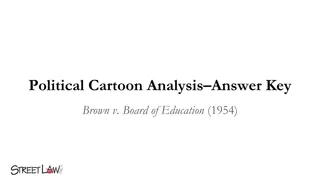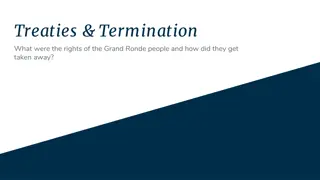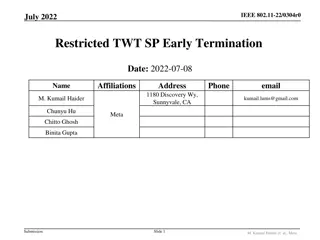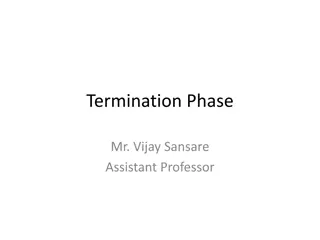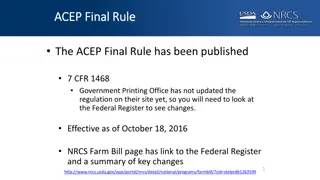The Grand Ronde Termination of 1954: Unjust Deed
In 1954, the Grand Ronde Tribe faced termination of federal recognition without consent, leading to loss of treaty rights, land, and tribal identity. This act was imposed despite the tribe's objections, highlighting a dark chapter in American history where Native American tribes were forcibly assimilated against their will.
Download Presentation

Please find below an Image/Link to download the presentation.
The content on the website is provided AS IS for your information and personal use only. It may not be sold, licensed, or shared on other websites without obtaining consent from the author. Download presentation by click this link. If you encounter any issues during the download, it is possible that the publisher has removed the file from their server.
E N D
Presentation Transcript
The Beginning of Termination In 1944, the federal government began its effort to liquidate or terminate federal responsibilities under treaty agreements for all tribes in the United States. The Bureau of Indian Affairs conducted inventory of the Grand Ronde reservation and reported positive social conditions and that most of the members were employed. In 1954, Congress concluded that the people on the Grand Ronde reservation were assimilated and no longer needed support from the government.
1954 Western Oregon Termination Act August 13th, 1954 Public Law 588 Western Oregon Termination Act was signed into law by President Eisenhower. Public Law 588 affected 2,100 Native Americans of sixty bands in western Oregon
True or False: Western Oregon Tribes agreed to termination.
Termination Without Consent Oral accounts from Grand Ronde Elders stated that the Tribe did not give consent for termination. In 1952, the tribe agreed to the first draft termination bill, which called for an early termination of western Oregon Indians. The first bill allowed for the tribe to keep the land they had been allotted and to manage their own timberlands. In 1953 a second termination bill was submitted to the tribes. This bill stated that along with termination, tribal members had to purchase their land. The tribe refused to approve the bill.
Termination Without Consent (continued) Tribal Elders stated that they had no knowledge of hearings regarding Termination in Washington, D.C. In March of 1954, Indian Superintendent E. Morgan Pryse submitted the second bill to Congress, stating that the tribes had agreed, which was not true. Congress approved the bill. Later, Indian Superintendent E. Morgan Pryse admitted there were voices in opposition and no vote about the termination draft ever occurred.
What did Termination mean for the Grand Ronde Tribes? The Termination Act terminated the Tribes federal recognition status, stripping their identity as a sovereign nation. The tribe lost all its treaty rights and land. The Termination Act removed all obligations that had been negotiated through treaties between the United States Government and the Tribes of Grand Ronde.
True or False: More tribes were terminated in Oregon than in any other region in the United States.
What did Termination mean for the Grand Ronde people? Many tribal members had to move because they could not afford to buy their land. Some tribal members were able to buy their land and stay in the Grand Ronde area. Jobs were extremely difficult to find. There were not many available and many companies would not hire Native Americans. Many cultural traditions were lost. The Tribe had the cemetery that remained community property. They had administrative rights over that property. Tribal members retained fishing and hunting rights during The Termination Era, because neither the treaties nor the Termination Act expressly addressed fishing and hunting rights.
It changed our lives. Things weren t the same after that. At the stroke of a pen they wiped us away. Margaret Provost, Grand Ronde Tribal Elder
The Termination Era The Grand Ronde reservation was officially closed in 1956. The Grand Ronde Tribes were left without any services in health care, education or welfare. Terminated Indians were highly comparable to new immigrants to American, with no resources, no savings, and little help from the government.
Indian Relocation Policy of 1956 As part of the Indian Termination Policy, The Indian Relocation Act of 1956, was passed. It was a federal law encouraging Native Americans, who lived on or near Indian reservations to relocate to urban areas for greater employment opportunities. It is estimated that between the 1950s and 1980s, as many as 750,000 Native Americans migrated to the cities, some as part of the relocation program
Termination-Jenness 2012-2.mov Confederated Tribes of Grand Ronde Elder, Margaret Provost, talks about living through termination.







